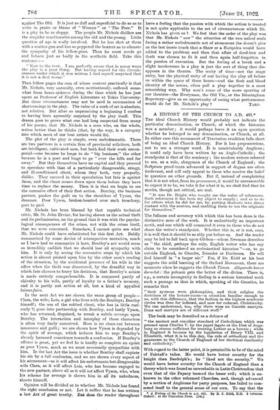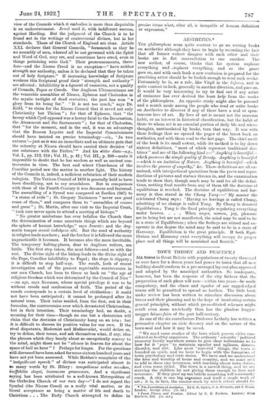A HISTORY OF THE CHURCH* TO A.D. 461.* THE ideal
Church History would probably not indicate the particular denomination, or Church, of which the historian was a member ; it would perhaps leave it an open question whether he belonged to any denomination, or Church, at all.
In either case this monument of Tractarian erudition falls short of being an ideal Church History. For it has prepossessions, not to use a stronger word. It is unmistakably Anglican ; it could only have been written by an Anglo-Catholic ; the standpoint is that of the seminary ; the modern writers referred to are, as a rule, clergymen of the Church of England ; the Scripture proof-texts advanced in support of dogma are often irrelevant, and will only appeal to those who receive the belief in question on other grounds. But if, instead of complaining that it is not what, from its provenance, it would be unreasonable to expect it to be, we take it for what it is, we shall find that its merits, though not critical, are real.
" It was Dr. Bright who taught me the value of references. Such references it has been my object to supply ; and so to do for others what he did for me, by putting, students into direct contact with the sources, and enabling them to use the originals for themselves."
The fullness and accuracy with which this has been done is the distinctive note of the work. It is undoubtedly an important merit, and one which will commend it even to those who do not share the writer's standpoint. Whether this is, or is not, ours, it is well that it should be so ably put before us. And the reader may be led to fall back upon Gibbon—whom. Newman describes as. " the chief, perhaps the only, English writer who has any claim to be considered an ecclesiastical historian "—or, to go outside England. to Gieseler, Neander or Duchesne. He will find himself in " a larger air." For, if Dr. Kidd at his best suggests the solid learning of the Ox ford Movement, there are moments when he suggests the Church Times. Aliquando bonus dormitat : the polemic gets the better of the divine. There is, e.g., a certain incongruity in finding in a serious historical work such a passage as that in which, speaking of the Gnostics, he remarks that
" their systems were philosophies, and their religion the doctrines of the lecture-room—a situation familiar enough to us, with this difference, that the fashion in the highest academic circles was then for inflated, and now• for reduced, Christianity. We can understand, too, why there were no. Gnostic martyrs. Dons and martyrs are of different stuff."
The book may be described as a defence of
" the ancient and conciliar standard of Catholicism which was pressed upon Charles V. by the papal legate at the Diet of Augs- burg, as reason sufficient for treating Luther as a heretic • while in England it became by the legislation of Henry VIII and Elizabeth, what it is to this day, the rale of orthodoxy and the guarantee to the Church of England of her doctrinal continuity and catholicity."
With regard to the latter point, it is permissible to be of the mind of Falstaff's tailor. He would have better security for the knight than Bardolph's ; he " liked not the security." We would have better security for the Church of England than a theory winch was found so unworkable in Latin Christendom that even that of the Papacy 'seemed the lesser evil; which is un- known to the other reformed Churches, and, though advanced by a section of Anglicans for party purposes, has failed to com- mend itself to the general sense of our own. To say that the • A Bistoey of the Church, to A.D. 481. By B. J. Kidd. D.D. 8 volumes. Oxford : at the Clarendon Press. [58e.) view of the Councils which it embodies is more than disputable is an understatement. Jewel used it, with indifferent success, against Harding. But the judgment of the Church is to be found not in the writings of controversial divines, but in her standards. Those of the Church of England are clear. Article XXI. declares that General Councils, " forasmuch as they be an assembly of men, whereof all be not governed with the Spirit and Word of God, may err, and sometimes have erred, even in things pertaining unto God." Their pronouncements, there- fore—and the Nicene Creed is no exception—" have neither strength nor authority, unless it be declared that they be taken out of holy Scripture." If increasing knowledge of Scripture weakens this Scriptural proof their " strength and authority " are affected : infallibility is a figment of canonists, not a quality of Councils, Popes or Creeds. Our Anglican Ultramontanes see the venerable assemblies of Nicaea, Ephesus and Chalcedon in the mystic twilight of dead centuries; the past has won " a glory from its being far." " It is not too much," says Dr. Kidd, " to claim for the Nicene Council that it saved not only Christianity but Theism " ; for that of Ephesus, that " the heresy which Cyril opposed was a heresy fatal to the Incarnation, the Atonement and the Sacraments " ; for that of Chalcedon, that " for the moment, and in the end, it was an advantage that the Roman Legates and the Imperial Commissioners should have insisted on precise terminology—viz., In two natures '—just as it was an immediate and an ultimate gain that the minority at Nicaea should have carried their decisive of one substance with the Father." And his obiter dicta—e.g., Vol. I., pp. 213, 219 ; Vol. IL, p. 41; Vol. III., p. 389—make it impossible to doubt that he has modern as well as ancient con- troversies in view. The best and wisest Churchmen of the Conciliar period saw the matter in another light. The history of the Councils is, indeed, a sufficient refutation of their modern eulogists. The Vatican Council of 1870 is generally held to have been disedifying, not to say scandalous. But in comparison with those of the Fourth Century it was decorous and fraternal. The assembling of a Synod was compared at Sardica (347) to " a storm of evils " ; St. Gregory Nazianzen " never saw good come of them," and compares them to " assemblies of cranes and geese " ; St. Martin, after one visit to the Imperial Court, " took care never again to attend a meeting of bishops."
" No greater misfortune has ever befallen the Church than the determination of some uncertain things which are beyond the sphere of human knowledge," says Jewett: and the dog- matic temper crescit indulgens sibi. But the road of authority irireligion leads nowhere ; and the further it is followed the more impracticable it becomes. It becomes also the more inevitable. The temporary halting-places, dear to Anglican writers, are futile. The first step taken, the next follows—and so with the rest. The divine right of the bishop leads to the divine right of the Pope, Conciliar infallibility to Papal ; the slope is slippery ; it is difficult to stop half-way. The result, both of recent investigation and of the present regrettable controversies in our own Church, has been to throw us back on " the age of religious freedom which was determined by the Council of Nice" —an age, says Newman, whose special privilege it was to be without creeds and confessions of faith. The period of the creeds corresponds to a certain level of civilization : it could not have been anticipated ; it cannot be prolonged after its natural term. Their value resided, from the first, not in their formulas, the controversies over which devastated Christendom, but in their intention. Their terminology had, no doubt, a meaning for their time—though no one but a rhetorician will claim that the destinies of Christianity hung on an iota ; but it is difficult to discern its positive value for our own. If the rival disputants, Modernist and Mediaevalist, would define or, try to define, their terms, and ask themselves what, if any, idea the phrases which they bandy about so energetically convey to the mind, might there not be " silence in heaven for about the space of half an hour " Y Perhaps for longer. For the questions still discussed have been asked for some sixteen hundred years and have not yet been answered. While Hobbes's complaint of the " insignificant speech " of divines was anticipated almost in so many words by St. Hilary : ecnnpellimus ardua sea ndere, ineffabilia eloqui, inconeessa praesumere. And a significant saying has been attributed to a well-known Metropolitan of the Orthodox Church of our own day—" I do not regard the Symbol (the Nicene Creed) as a really vital matter, or its literal acceptance as being a matter of life and death to Christians . . . The Early Church attempted to define in precise terms what, after all, is incapable of human definition or expression."



































 Previous page
Previous page